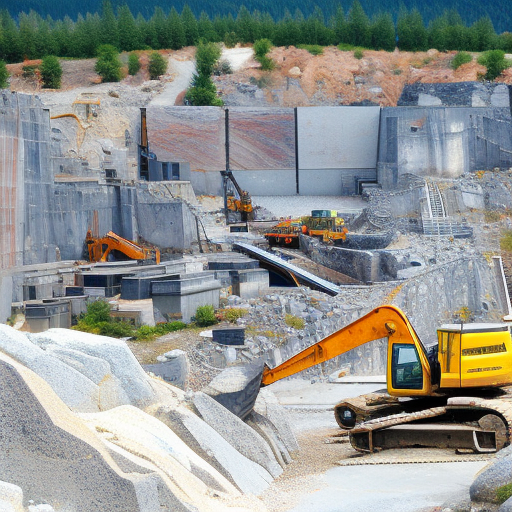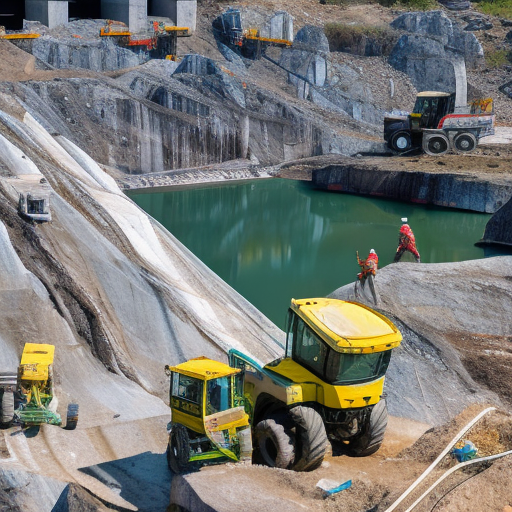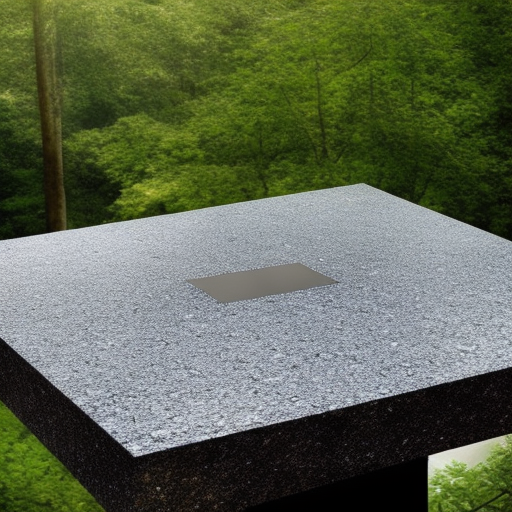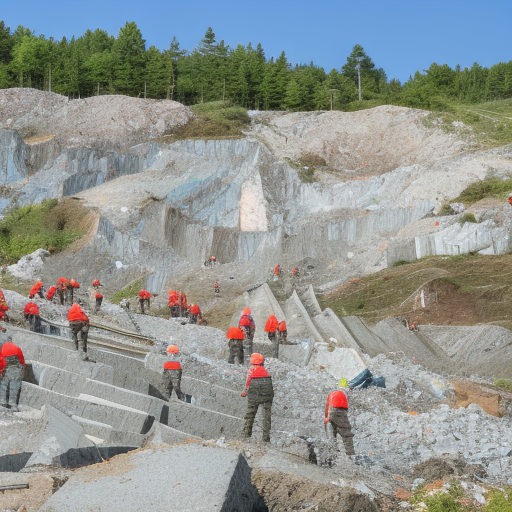In recent years, there has been growing concern about the environmental impact of various materials used in home construction and design. One such material that has come under scrutiny is granite countertops. As a popular choice for kitchen and bathroom surfaces, granite countertops have raised questions about their eco-friendliness. This article aims to delve into the environmental impact of granite countertops, exploring the facts and dispelling any misconceptions. By understanding the true impact of granite countertops and weighing the pros and cons, we can make more eco-conscious choices in our home design. Join us as we take a closer look at the environmental implications of granite countertops and explore how they can be more environmentally friendly.
1. “Understanding the Environmental Impact of Granite Countertops: A Closer Look”

Granite countertops have gained popularity in recent years due to their durability, elegance, and natural beauty. However, it is essential to consider the environmental impact of choosing granite for your countertops. Understanding the environmental impact of granite countertops requires a closer look at various aspects of their production and extraction process.
Granite is a natural stone that is mined from quarries around the world. The extraction process involves drilling, blasting, and cutting the stone from the earth, which can have significant environmental consequences. The use of heavy machinery and explosives contributes to air pollution, soil erosion, and habitat destruction. Additionally, the transportation of granite from quarries to manufacturing facilities and then to retailers adds to carbon emissions and energy consumption.
Another important factor to consider is the energy consumption during the manufacturing process. Granite countertops require cutting, polishing, and finishing, which involves the use of water, electricity, and chemicals. The extraction and processing of granite demand a substantial amount of energy, contributing to greenhouse gas emissions and the depletion of natural resources.
However, it is worth noting that granite is a durable material with a long lifespan. Its resistance to scratches, heat, and stains reduces the need for replacement or repair, ultimately reducing waste generation. Granite countertops can also be recycled or repurposed, further minimizing their environmental impact.
To mitigate the environmental impact of granite countertops, it is crucial to consider sustainable sourcing and manufacturing practices. Some companies are now offering responsibly sourced granite that adheres to strict environmental and labor standards. Additionally, advancements in the industry have led to the development of eco-friendly sealants and adhesives that minimize the use of harmful chemicals during installation.
In conclusion, while granite countertops offer numerous benefits, they do have an environmental impact that should not be overlooked. By understanding the various aspects of their production and taking steps towards sustainable sourcing and manufacturing, it is possible to minimize their negative effects. Ultimately, it is important to weigh the aesthetic appeal and durability of granite against its environmental impact when making eco-conscious choices for your countertops.
2. “Exploring the Eco-Friendliness of Granite Countertops: Separating Fact from Fiction”

Exploring the Eco-Friendliness of Granite Countertops: Separating Fact from Fiction
Granite countertops have long been a popular choice for homeowners due to their durability, aesthetic appeal, and perceived eco-friendliness. However, there is often confusion surrounding the environmental impact of using granite for countertops. In this section, we will delve into the topic and separate fact from fiction, shedding light on the true eco-friendliness of granite countertops.
One common misconception is that granite countertops deplete natural resources. While it is true that granite is a natural stone extracted from the earth, the quarrying process is not as harmful as some may believe. Granite is abundant and widely available, and responsible quarrying practices can minimize environmental impact. Reputable granite suppliers adhere to strict regulations, ensuring that the extraction process is conducted responsibly, minimizing damage to ecosystems and local communities.
Another myth surrounding granite countertops is that their production emits significant amounts of greenhouse gases. It is true that the manufacturing process involves energy consumption, but advancements in technology have significantly reduced the carbon footprint of granite production. Many granite manufacturers now utilize water recycling systems and energy-efficient machinery, reducing the environmental impact of the production process.
Furthermore, granite countertops are known for their longevity. Unlike other countertop materials that may require frequent replacement, granite can last a lifetime when properly maintained. This durability reduces the demand for new countertops, ultimately minimizing waste and reducing the overall environmental impact.
Additionally, granite is a highly recyclable material. In the event that a granite countertop needs to be replaced, it can often be repurposed or recycled into other products, reducing the need for virgin materials. This aspect further contributes to the eco-friendliness of granite countertops.
It is important to note that while granite itself is considered eco-friendly, the entire lifecycle of a countertop should be taken into account. Factors such as transportation, installation, and maintenance can affect the overall environmental impact. Opting for locally sourced granite can reduce transportation emissions, while using eco-friendly sealers and cleaners can minimize the use of harmful chemicals during maintenance.
In conclusion, granite countertops can indeed be considered eco-friendly when sourced and manufactured responsibly. With proper quarrying practices, energy-efficient production methods, and a focus on durability and recyclability, granite countertops can be a sustainable choice for homeowners. However, it is crucial to consider the entire lifecycle of a countertop and adopt eco-friendly practices throughout its use and maintenance. By separating fact from fiction, we can make informed decisions about the environmental impact of granite countertops and contribute to a more sustainable future.
3. “Granite Countertops and the Environment: Weighing the Pros and Cons”

Granite countertops have become a popular choice in many homes due to their natural beauty and durability. However, it is essential to consider the environmental impact of these countertops before making a decision. By weighing the pros and cons, we can determine whether granite countertops are truly eco-friendly.
One of the main advantages of granite countertops is their longevity. Granite is a durable material that can withstand heavy use and last for decades. This means that homeowners do not need to replace their countertops frequently, reducing the overall environmental impact. Unlike other materials that may need to be replaced every few years, granite countertops can remain intact for a lifetime with proper care.
Moreover, granite is a natural stone that is widely available and does not require extensive manufacturing processes. It is quarried from the earth, shaped into slabs, and polished for installation. This minimal processing reduces the carbon footprint associated with the production of granite countertops. Additionally, granite is non-toxic and does not emit harmful chemicals into the environment, ensuring a safe and healthy living space.
However, there are some potential drawbacks to consider when it comes to the environmental impact of granite countertops. The extraction of granite from quarries can have negative consequences on the surrounding ecosystems. Mining activities can disrupt habitats, cause soil erosion, and alter the natural landscape. This can lead to the loss of biodiversity and ecological balance in the area.
Transportation is another factor to consider. Granite is often sourced from distant locations, resulting in significant energy consumption and carbon emissions during transportation. It is crucial to choose suppliers that prioritize sustainable transportation methods to minimize the impact on the environment.
Another potential concern is the sealing and maintenance of granite countertops. Some sealants used to protect the stone can contain chemicals that are harmful to the environment. However, there are eco-friendly sealants available in the market, which can mitigate this issue. Additionally, proper maintenance, such as regular cleaning with non-toxic products, can help reduce the environmental impact associated with granite countertops.
In conclusion, when it comes to the environmental impact of granite countertops, there are both pros and cons to consider. The durability and longevity of granite countertops contribute to their eco-friendliness, as they reduce the need for frequent replacements. The minimal processing of the natural stone also minimizes the carbon footprint during production. However, the extraction process and transportation can have negative impacts on the environment. By choosing suppliers that prioritize sustainability and using eco-friendly sealants, homeowners can mitigate these concerns. Ultimately, it is crucial to weigh these factors and make an informed decision that aligns with both aesthetic preferences and environmental consciousness.
4. “Eco-Conscious Choices: How Granite Countertops Can Be More Environmentally Friendly”

When it comes to making eco-conscious choices for our homes, granite countertops may not be the first option that comes to mind. However, with careful consideration and responsible sourcing, granite countertops can actually be a more environmentally friendly choice.
One way granite countertops can be eco-friendly is through responsible sourcing practices. It is important to choose a supplier that obtains granite from quarries that prioritize sustainable mining techniques. This means ensuring that the quarry follows proper regulations to minimize environmental impact, such as reclamation plans to restore the land after mining operations are complete. By supporting responsible quarrying practices, we can help reduce the negative environmental impact associated with granite extraction.
Another aspect to consider is the durability of granite countertops. Unlike other countertop materials that may need to be replaced more frequently, granite is incredibly durable and long-lasting. This means that once installed, granite countertops can withstand the test of time, reducing the need for replacements and minimizing waste. Additionally, the durability of granite makes it less likely to be damaged, further extending its lifespan and reducing the environmental impact associated with production and disposal.
Granite countertops are also naturally heat-resistant, which can contribute to energy efficiency in the home. With their ability to withstand high temperatures, granite countertops reduce the need for additional insulation or protective materials when placing hot pots or pans on the surface. This not only saves energy but also reduces the use of other materials that may have their own environmental impact.
Furthermore, granite is a natural material that does not emit harmful chemicals or toxins. This is especially important in a space like the kitchen, where food is prepared and consumed. By choosing granite countertops, we can ensure a healthier indoor environment for ourselves and our families.
In conclusion, granite countertops can be an eco-friendly choice when certain factors are considered. By supporting responsible sourcing practices, opting for a durable material, and benefiting from its natural properties, granite can be a sustainable option for your kitchen or bathroom. So, if you’re looking for an environmentally friendly countertop material that adds natural beauty and durability to your space, consider granite as a viable option.




